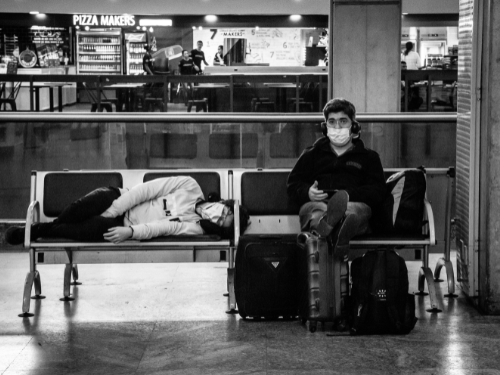By Hiroshima University Department of Public Relations
Simulation results suggest imposing a quarantine policy is the most effective in controlling coronavirus while maintaining the tourism economy. (Marcelo Renda via Pexels)
What policies should be the ideal COVID-19 strategy to control outbreaks without closing borders and compromising the tourism economy? The search for answers led researchers to one crucial protocol.
To contain the pandemic, various policies restricting travel have been put in place. These policies, however, harmed many economic sectors, especially tourism. Simulations ran by a team of Hiroshima University (HU) researchers found that imposing quarantine protocols proved to be the most effective measure when it comes to avoiding outbreaks and disruptions on tourism services.
“A comparison of results from all scenarios suggests that quarantine policy is the most effective policy to control the spread of COVID-19, while maintaining tourism development,” the researchers said in their study published in the journal Tourism Economics.
“The infection cases could remain stable at zero with extremely strict quarantine policies, while the decline of tourism income could be kept at a very slow pace.”
ALSO READ: An aging Japanese island’s lessons on the future of sustainable travel
The research team developed a system dynamics (SD) model to explore effective COVID-19 measures that can be used by developing nations dependent on tourism, such as Thailand, Laos, and Vietnam. But added that it can also be applied to developed countries. They used the early stages of the pandemic in Cambodia as a case study.
The quarantine policy used in the study assumes all cross-border travelers and returnees are required to isolate at designated facilities for at least 14 days after entry into Cambodia and to undergo regular RT-PCR testing during the stay period.
SD models help in understanding complex systems by running comprehensive and quantitative simulations. According to the researchers, their study is among the first to use an SD model in the context of a developing country in exploring answers on how to balance the national economy via tourism development and at the same time, control the COVID-19 pandemic.
Using the model, they examined the policies of international transportation bans, domestic transportation bans, quarantine protocols, tourist-centered protection, and enterprise-led protection. The researchers then compared policies individually and in combinations with roles of key stakeholders — government, businesses, and tourists — incorporated. For merged policies, six packages were designed for the study.
Best-performing package of tourism policies identified
Research findings also showed that a COVID-19 strategy combining quarantine protocols, tourist-centered protection, and enterprise-led safeguards outperforms other groupings of tourism-oriented policies when it comes to virus spread prevention and rescuing the travel economy.
“Economic activities could be maintained even under the impacts of COVID-19, which, however, must be supported by very strict quarantine policies under close collaboration with both tourists and tourism enterprises,” said the study’s corresponding author Junyi Zhang, professor at HU’s Graduate School of Advanced Science and Engineering.
Enterprise-led protection measures refer to business investments in virus prevention. Meanwhile, tourist-centered protection policies concern efforts that require the active involvement of travelers in fighting COVID-19. These include wearing face masks, handwashing, keeping social distance, and reducing activities such as entertainment and use of domestic transportation.
ALSO READ: Highly dense urban areas are not more vulnerable to COVID-19, researchers say
The researchers highlighted the importance of government support to the COVID-19 policies via laws and regulations.
“The laws and regulations should also allow local governments to use non-medical facilities with unoccupied spaces for isolating infected people, to punish firms, organizations and people (including tourists) who violate rules, and to provide financial and technical support as well as compensation measures,” they said in the paper.
“Firms obeying the aforementioned laws and regulations should be well supported, financially and technically.”
This study is part of a large-scale pandemic-related international joint research initiative led by the World Conference on Transport Research Society’s (WCTRS) COVID-19 Task Force.
“Similar research will be conducted in other countries, such as Japan and China,” Zhang, who co-chairs the WCTRS COVID-19 Task Force, said.
“The initiative aims to investigate the impacts of COVID-19. It hopes to clarify what societies had prepared for such a pandemic, to reveal what measures societies are currently taking to fight this pandemic, to suggest what societies should do after this pandemic and how to generalize the findings from the above tasks to tackle the next waves of COVID-19 and future pandemics.”
(Research news authored by Mikas Matsuzawa)


 Home
Home


